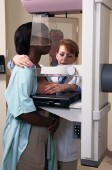- Could Your Grocery Store Meat Be Causing Recurring UTIs?
- Are You Making This Expensive Thermostat Error This Winter?
- Recognizing the Signs of Hypothyroidism
- 10 Strategies to Overcome Insomnia
- Could Artificial Sweeteners Be Aging the Brain Faster?
- Techniques for Soothing Your Nervous System
- Does the Water in Your House Smell Funny? Here’s Why
- Can a Daily Dose of Apple Cider Vinegar Actually Aid Weight Loss?
- 6 Health Beverages That Can Actually Spike Your Blood Sugar
- Treatment Options for Social Anxiety Disorder
Race, Ethnicity Affect Breast Cancer Survival, Study Shows


Your chances of being diagnosed with early breast cancer, as well as surviving it, vary greatly depending on your race and ethnicity, a new study indicates.
“It had been assumed lately that we could explain the differences in outcome by access to care,” said lead researcher Dr. Steven Narod, Canada research chair in breast cancer and a professor of public health at the University of Toronto. In previous studies, experts have found that some ethnic groups have better access to care.
But that’s not the whole story, Narod found. His team discovered that racially based biological differences, such as the spread of cancer to the lymph nodes or having an aggressive type of breast cancer known as triple-negative, explain much of the disparity.
“Ethnicity is just as likely to predict who will live and who will die from early breast cancer as other factors, like the cancer’s appearance and treatment,” Narod said.
In his study, nearly 374,000 women who were diagnosed with invasive breast cancer between 2004 and 2011 were followed for about three years.
The researchers divided the women into eight racial or ethnic groups and looked at the types of tumors, how aggressive the tumors were and whether they had spread.
During the study period, Japanese women were more likely to be diagnosed at stage 1 than white women were, with 56 percent of Japanese women finding out they had cancer early, compared to 51 percent of white women.
But only 37 percent of black women and 40 percent of South Asian women got an early diagnosis, the findings showed.
When the researchers calculated the seven-year risk of death, black women had the highest risk, with a 6 percent death rate. South Asian women (Asian Indian, Pakistani) had the lowest, at less than 2 percent.
And black women were nearly twice as likely as white women to die following the diagnosis of small tumors, according to the study published Jan. 13 in the Journal of the American Medical Association.
The new research “makes significant strides in explaining the well-known racial disparities in breast cancer,” said Dr. Bobby Daly, a hematology-oncology fellow at the University of Chicago Medical Center. He co-authored an editorial that accompanied the study.
“It makes strides in showing how the difference in survival may reflect intrinsic differences in the biology of the tumor,” he added.
However, there still needs to be improvements in access to care, treating women according to established guidelines and avoiding treatment delays, Daly noted.
Regardless of race or ethnicity, women should be aware of any family history of breast cancer, be aware of other risk factors they may have, and obtain appropriate screening with mammograms, he said.
Women in minority groups must also be included in greater numbers in future research, the authors of the editorial said.
More information
To learn more about disparities in cancer survival, visit the U.S. National Cancer Institute.
Source: HealthDay
Copyright © 2026 HealthDay. All rights reserved.










